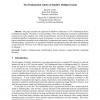187 search results - page 15 / 38 » Distributed Constraints for Large-Scale Scheduling Problems |
156
click to vote
DFVLR
1987
15 years 6 months ago
1987
: This paper examines the argument for dataflow architectures in "Two Fundamental Issues in Multiprocessing[5]." We observe two key problems. First, the justification of ...
104
click to vote
JPDC
2006
15 years 2 months ago
2006
We present provably efficient parallel algorithms for sweep scheduling, which is a commonly used technique in Radiation Transport problems, and involves inverting an operator by i...
116
click to vote
CIA
2007
Springer
15 years 9 months ago
2007
Springer
Abstract. In this paper we investigate methods for analyzing the expected value of adding information in distributed task scheduling problems. As scheduling problems are NP-complet...
120
click to vote
AAAI
1994
15 years 4 months ago
1994
In this paper, we study the problem of achieving efficient interaction in a distributed scheduling system whose scheduling agents may borrow resources from one another. Specifical...
126
click to vote
CP
1998
Springer
15 years 7 months ago
1998
Springer
The constraint paradigm provides powerful concepts to represent and solve different kinds of planning problems, e. g. factory scheduling. Factory scheduling is a demanding optimiz...

